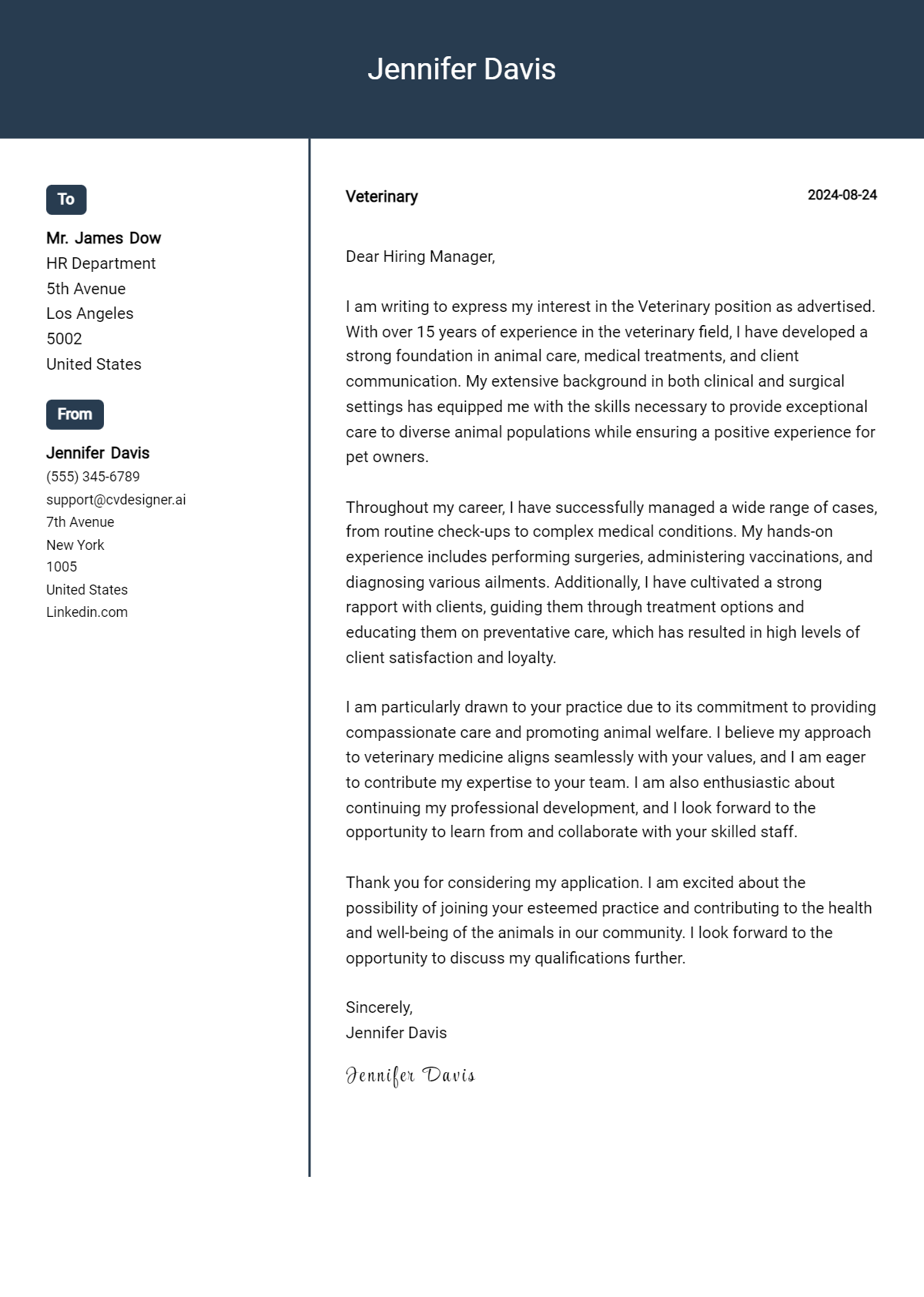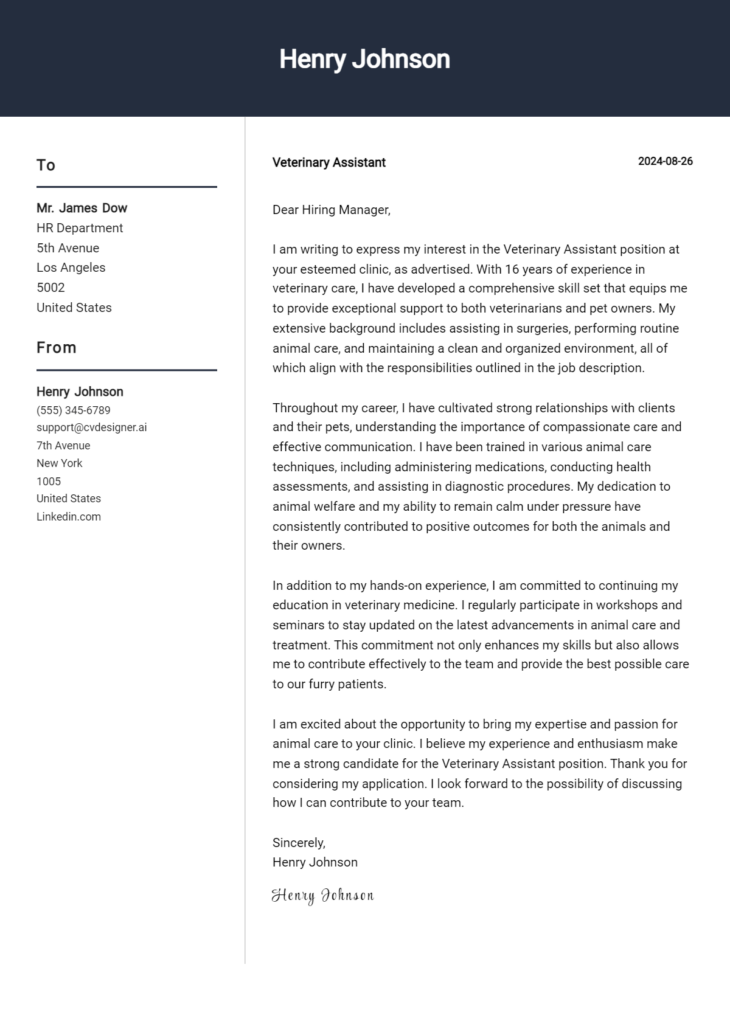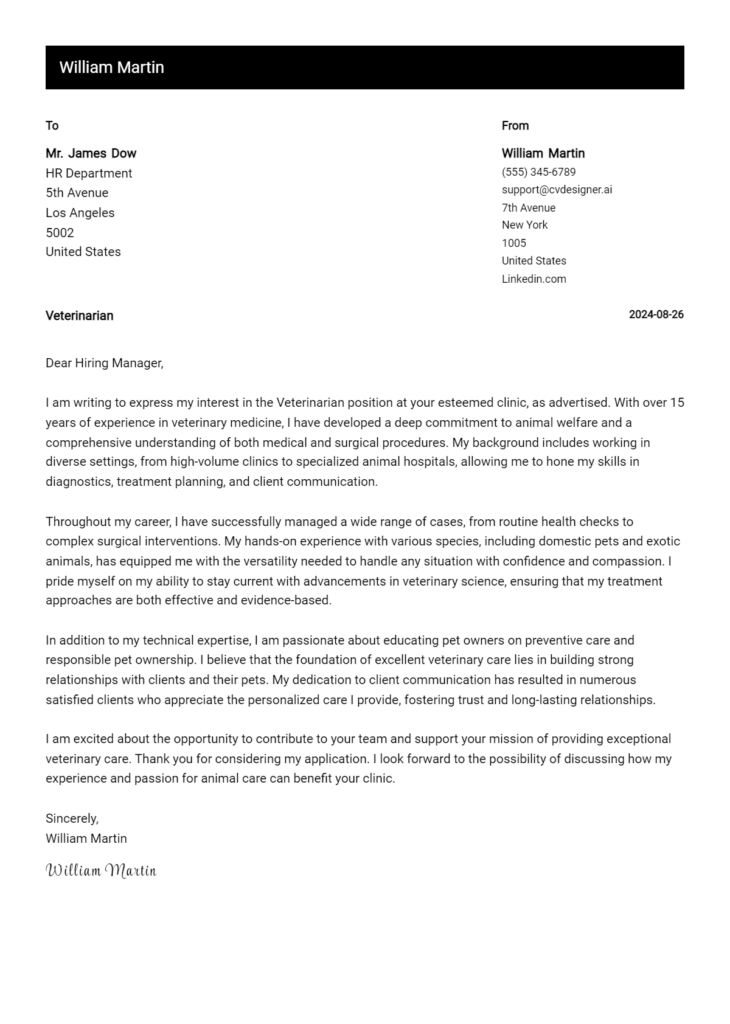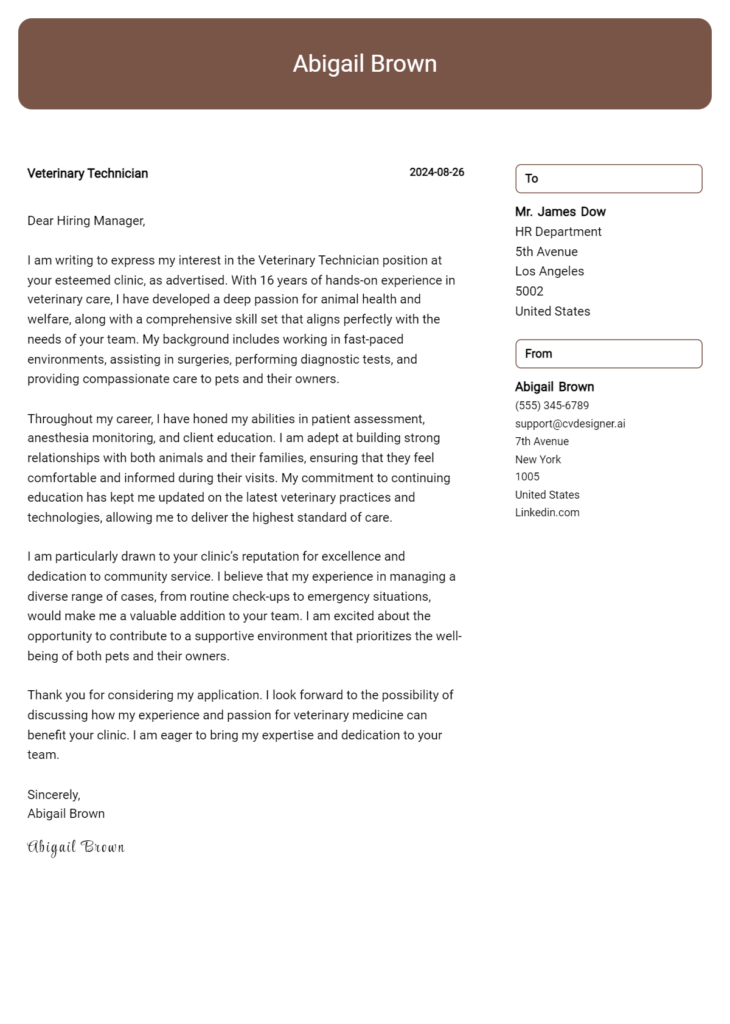Most Popular Veterinary Cover Letter Examples
Explore additional Veterinary cover letter samples and guides and see what works for your level of experience or role.
Crafting a compelling cover letter is a crucial step in securing a position in the veterinary field, where your passion for animal care and your professional skills must shine through. In this comprehensive guide, we will walk you through the essentials of writing a veterinary cover letter that stands out to potential employers. Whether you're a fresh graduate or an experienced veterinarian, understanding the nuances of cover letter writing can make all the difference in showcasing your qualifications and enthusiasm for the role. Here’s what you can expect to learn in this article:
- What does a Veterinary Cover Letter accomplish?
- Key Components of a Veterinary Cover Letter
- How to Format a Veterinary Cover Letter
- Examples of cover letters for three different experience levels
- Common Mistakes to Avoid in a Veterinary Cover Letter
- Key Takeaways to enhance your cover letter writing skills
By the end of this article, you'll be equipped with the tools and knowledge needed to create a standout cover letter that captures the attention of hiring managers in the veterinary industry. Let’s dive in!
What does a Veterinary Cover Letter accomplish?
A veterinary cover letter serves as a vital introduction to your qualifications and passion for animal care, allowing you to establish a personal connection with potential employers. It highlights your relevant experience, skills, and commitment to animal welfare, setting you apart from other candidates. A well-crafted cover letter can effectively convey your enthusiasm for the position and the unique qualities you bring to the practice. To create a standout document, you can refer to a comprehensive cover letter guide or utilize a cover letter builder to streamline the writing process, ensuring that your application reflects your dedication to veterinary medicine.
Key Components of a Veterinary Cover Letter
- Introduction: Begin your cover letter with a strong introduction that clearly states the position you are applying for, how you found out about the job, and a brief overview of your qualifications. This sets the tone and grabs the employer's attention.
- Relevant Experience: Highlight your relevant veterinary experience, including internships, volunteer work, or previous employment. Be specific about your responsibilities and achievements, showcasing how they align with the job requirements.
- Skills and Attributes: Discuss the key skills and personal attributes that make you a suitable candidate for the position. This can include both technical skills (like anesthesia administration or surgical assistance) and soft skills (such as compassion, communication, and teamwork).
- Conclusion and Call to Action: Conclude your cover letter by expressing your enthusiasm for the position and the organization. Include a call to action, inviting the employer to contact you for an interview to discuss your application further.
For additional guidance, you can explore cover letter examples or learn about the proper cover letter format.
How to Format a Veterinary Cover Letter
When applying for a veterinary position, a well-structured cover letter is essential to showcase your passion for animal care and your professional qualifications. A strong cover letter not only highlights your skills but also conveys your commitment to the veterinary profession. Here are key points to consider when formatting your veterinary cover letter:
- Personalize the Greeting: Address the letter to a specific hiring manager or veterinarian to demonstrate your attention to detail and genuine interest in the position.
- Strong Opening Statement: Start with a compelling first sentence that captures your enthusiasm for the role and briefly mentions your relevant experience.
- Highlight Relevant Qualifications: Clearly outline your educational background, including degrees and certifications, as well as any specialized training in veterinary medicine.
- Showcase Experience: Discuss your hands-on experience with animals, including internships, volunteer work, or previous employment that is directly related to veterinary care.
- Emphasize Soft Skills: Highlight important soft skills, such as communication, empathy, and teamwork, which are vital for interacting with both animals and their owners.
- Mention Specific Skills: Include any specific technical skills or proficiencies, such as surgical techniques, diagnostic imaging, or knowledge of veterinary software systems.
- Demonstrate Passion for Animal Welfare: Share your motivations for becoming a veterinarian and your commitment to animal welfare to convey your dedication to the field.
- Tailor Content to the Job Description: Align your cover letter with the specific requirements and responsibilities outlined in the job posting, demonstrating that you are a perfect fit for the role.
- Express Enthusiasm for the Practice: Research the veterinary practice or organization and mention something specific that excites you about working there, whether it's their philosophy, specialties, or community involvement.
- Conclude with a Call to Action: End your letter by expressing your eagerness to discuss your application further in an interview, and thank the reader for considering your application.
Veterinary Entry-Level Cover Letter Example #1
I am writing to express my enthusiasm for the entry-level veterinary position at [Veterinary Clinic/Hospital Name], as advertised on [where you found the job listing]. With a recently obtained degree in Veterinary Technology from [Your University] and hands-on experience through internships and volunteer work, I am eager to contribute my skills and passion for animal care to your esteemed team.
During my academic training, I gained comprehensive knowledge in animal anatomy, physiology, and the principles of veterinary medicine. My internship at [Specific Clinic or Animal Shelter] allowed me to apply this knowledge in a real-world setting, where I assisted veterinarians in performing routine examinations, administering vaccinations, and providing post-operative care. This experience not only honed my technical skills but also taught me the importance of compassionate communication with pet owners, ensuring that they feel informed and supported throughout their visits.
Additionally, my volunteer work with [Animal Rescue Organization or Local Shelter] provided me with invaluable experience in handling a diverse range of animals, including those with special needs or behavioral challenges. Through this role, I developed my ability to work effectively under pressure and to collaborate with a team to ensure the well-being of all animals in our care. I am particularly proud of my contribution to a community outreach program that educated pet owners on responsible pet care and the importance of spaying and neutering.
I am excited about the opportunity to bring my dedication to animal welfare and my eagerness to learn to [Veterinary Clinic/Hospital Name]. I am confident that my background and passion align well with your clinic's mission, and I look forward to the possibility of contributing to your team. Thank you for considering my application. I hope to discuss my qualifications with you further and explore how I can support the exceptional care you provide to your patients.
Veterinary Mid-Level Cover Letter Example #2
I am writing to express my interest in the mid-level veterinary position at [Veterinary Clinic/Hospital Name] as advertised on [Job Board/Company Website]. With a Doctor of Veterinary Medicine degree from [Your University] and over [X years] of comprehensive experience in both clinical and emergency settings, I am excited about the opportunity to contribute my skills and passion for animal care to your esteemed team.
In my previous role at [Previous Employer], I successfully managed a diverse caseload, performing routine examinations, vaccinations, and emergency procedures. My commitment to providing high-quality veterinary care was recognized through positive client feedback and a notable increase in repeat clientele. I developed a keen understanding of various animal species, ensuring that I tailored my approach to meet the specific needs of each patient. Additionally, I collaborated closely with a team of veterinary technicians and support staff to streamline operations, resulting in improved efficiency and enhanced patient outcomes.
One of my key achievements was leading a community outreach program that focused on educating pet owners about preventive care and responsible pet ownership. This initiative not only fostered stronger relationships within the community but also significantly increased our clinic's visibility and client base. I am passionate about promoting animal welfare and believe that education is a vital component in achieving this goal. I am eager to bring my proactive approach and community-oriented mindset to [Veterinary Clinic/Hospital Name].
Furthermore, I am well-versed in utilizing advanced diagnostic tools and technologies, including digital radiography and ultrasound, which have proven invaluable in diagnosing complex cases. My ability to stay calm and focused in high-pressure situations has equipped me to handle emergencies effectively, ensuring that every animal receives the prompt and appropriate care they deserve. I am also dedicated to continuous professional development, regularly attending workshops and conferences to stay abreast of the latest advancements in veterinary medicine.
I am excited about the possibility of joining [Veterinary Clinic/Hospital Name] and contributing to your mission of providing compassionate and exceptional care to animals. Thank you for considering my application. I look forward to the opportunity to discuss how my experience and skills align with the needs of your team.
Veterinary Experienced Cover Letter Example #3
I am writing to express my interest in the veterinary position at [Clinic/Hospital Name] as advertised on [where you found the job listing]. With over [number] years of extensive experience in veterinary medicine, I am confident in my ability to contribute effectively to your team and provide exemplary care to both pets and their owners.
Throughout my career, I have had the privilege of working in diverse settings, including high-volume clinics and specialized animal hospitals. My experience includes diagnosing and treating a wide range of medical conditions, performing surgeries, and developing personalized treatment plans that prioritize the health and well-being of my patients. For instance, during my tenure at [Previous Employer], I successfully managed a caseload of [number] patients per week, implementing innovative treatment protocols that improved patient outcomes by [percentage or specific result]. My commitment to continuous learning has allowed me to stay updated on the latest veterinary advancements, which I eagerly apply to my practice.
In addition to my clinical skills, I am passionate about client education and communication. I believe that building strong relationships with pet owners is essential for effective treatment and preventative care. At [Previous Employer], I initiated a series of workshops focused on pet health and wellness, which not only educated clients but also fostered a sense of community. This initiative led to a [percentage] increase in client retention and satisfaction, reinforcing my belief in the power of proactive communication.
I am particularly drawn to [Clinic/Hospital Name] because of your commitment to [specific values or services of the clinic, such as high-quality care, community involvement, etc.]. I am excited about the opportunity to bring my expertise in veterinary medicine and my passion for animal welfare to your esteemed practice. I am eager to collaborate with your team to continue providing exceptional care and support to our furry friends and their families.
Thank you for considering my application. I look forward to the possibility of discussing how my experience and vision align with the goals of [Clinic/Hospital Name]. Please feel free to contact me at [your phone number] or [your email address] to arrange a conversation. I am excited about the opportunity to contribute to your team and make a positive impact in the lives of animals and their owners.
Cover Letter Tips for Veterinary
When crafting a cover letter for a veterinary position, it's essential to convey not only your professional qualifications but also your passion for animal care and welfare. Start by addressing the specific needs of the veterinary practice you are applying to, showcasing your understanding of their services and values. Personalize your letter with anecdotes that highlight your experience with animals, whether through previous employment, internships, or volunteer work. This will demonstrate your commitment to the field and your ability to connect with both animals and their owners. Remember to keep your cover letter concise, focused, and professional while allowing your genuine enthusiasm for veterinary medicine to shine through.
Cover Letter Tips for Veterinary:
- Tailor Your Letter: Customize your cover letter for each position by mentioning the specific practice and how your skills align with their services and mission.
- Highlight Relevant Experience: Clearly outline any relevant clinical experience, internships, or volunteer work that showcases your practical skills with animals.
- Showcase Soft Skills: Emphasize essential soft skills such as communication, empathy, and teamwork, which are critical in a veterinary environment.
- Include a Personal Touch: Share a brief story or experience that illustrates your passion for animal care, demonstrating your genuine interest in the profession.
- Be Professional: Maintain a professional tone throughout your letter, avoiding overly casual language while still allowing your personality to come through.
- Proofread Carefully: Ensure your cover letter is free of grammatical and spelling errors, as attention to detail is crucial in the veterinary field.
- Mention Continuing Education: If applicable, highlight any continuing education courses or certifications that enhance your qualifications and show your commitment to professional growth.
- Express Enthusiasm: End your cover letter on a positive note, expressing your eagerness to contribute to the veterinary team and your excitement for the opportunity to discuss your application further.
How to Start a Veterinary Cover Letter
As you embark on writing your veterinary cover letter, it's crucial to make a strong first impression. An engaging introduction can set the tone for the rest of your application, showcasing your passion for animal care and your qualifications for the position. Here are some effective examples to inspire your opening paragraph:
"As a dedicated veterinarian with over five years of experience in clinical practice and a deep commitment to animal welfare, I am excited to apply for the Veterinary position at [Clinic Name]. My background in both emergency care and routine check-ups has equipped me with the skills to provide exceptional care and support to pets and their owners."
"With a Doctor of Veterinary Medicine degree from [University Name] and a fervent passion for enhancing animal health, I am thrilled to submit my application for the Veterinary role at [Clinic Name]. I have a strong foundation in treating a variety of species and a proven track record in client education and community outreach."
"Having spent the last three years as an associate veterinarian at [Previous Clinic Name], I am eager to bring my expertise in preventive care and surgical procedures to the team at [Clinic Name]. My hands-on experience in a fast-paced environment has prepared me well for the challenges and rewards of veterinary medicine."
"As a lifelong animal lover and a recent graduate from [University Name], I am excited to apply for the Veterinary position at [Clinic Name]. Through my internships and volunteer work at local shelters, I have gained invaluable experience in both clinical and rescue settings, and I am eager to contribute to your mission of providing outstanding care."
"I am writing to express my interest in the Veterinary position at [Clinic Name]. With my extensive experience in both small and large animal care, combined with my commitment to continuing education and best practices, I believe I would be a valuable addition to your team."
How to Close a Veterinary Cover Letter
Closing a cover letter effectively is crucial in leaving a lasting impression on potential employers in the veterinary field. Here are several examples of how you can conclude your veterinary cover letter:
“I am eager to bring my passion for animal care and my commitment to veterinary excellence to your team. Thank you for considering my application; I look forward to the opportunity to discuss how I can contribute to your clinic.”
“I am excited about the possibility of joining your esteemed practice and providing exceptional care to your patients. I appreciate your time and consideration, and I hope to discuss my application further in an interview.”
“Thank you for reviewing my application. I am enthusiastic about the opportunity to work with your skilled team and make a positive impact on the lives of animals and their owners.”
“I look forward to the possibility of discussing my qualifications with you in more detail. Thank you for considering my application, and I hope to contribute to the compassionate care at your veterinary practice.”
Common Mistakes to Avoid in a Veterinary Cover Letter
When applying for a veterinary position, your cover letter serves as a crucial introduction to potential employers. It is your opportunity to showcase your passion for animal care, your relevant experience, and your unique qualifications. However, many candidates make common mistakes that can detract from their message and diminish their chances of securing an interview. To help you craft an effective cover letter, here are some pitfalls to avoid:
- Failing to customize the letter for the specific job and organization.
- Using a generic greeting, such as "To Whom It May Concern," instead of addressing the hiring manager by name.
- Focusing too much on personal experiences without relating them to the job requirements or the organization’s mission.
- Not highlighting relevant skills and qualifications that align with the veterinary role.
- Neglecting to proofread for spelling and grammatical errors, which can undermine professionalism.
- Being overly formal or using jargon that may not resonate with the reader.
- Making the letter too lengthy; aim for a concise, one-page format.
- Omitting a clear call to action, such as expressing a desire for an interview or further discussion.
- Failing to demonstrate genuine enthusiasm for the position and the organization.
- Not including specific examples of achievements or experiences that illustrate your capabilities.
Key Takeaways for a Veterinary Cover Letter
In crafting a compelling veterinary cover letter, it's essential to highlight your passion for animal care and your relevant experience in the field. Start by showcasing your qualifications, whether it be through education, internships, or hands-on experience in veterinary clinics. Emphasize your skills in diagnosing and treating animals, as well as your ability to communicate effectively with pet owners. By tailoring your cover letter to the specific job and demonstrating your commitment to animal welfare, you can make a strong impression on potential employers.
Utilizing resources like cover letter templates can help you structure your letter professionally, ensuring it is both engaging and informative. Additionally, consider using a cover letter builder to streamline the writing process, allowing you to focus on articulating your passion and expertise in veterinary medicine. With the right approach, your cover letter can serve as a powerful tool to showcase your dedication and skills, setting you apart in a competitive job market.




